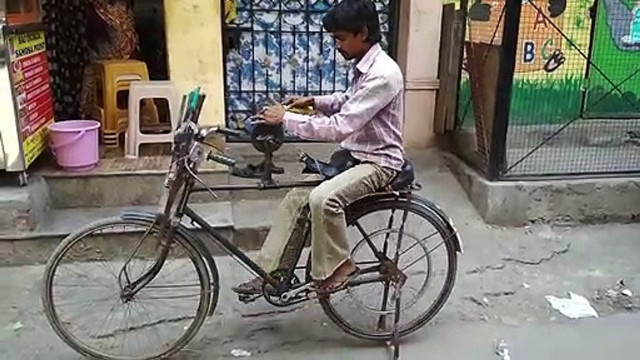Bicycle knife sharpeners fight a lost battle
Modern tech renders a time-honoured tradition irrelevant

The time-honoured craft of sharpening knives, scissors, and other tools days before Eidul Azha is approaching extinction in the garrison city.
For nearly a century, artisans with small six-inch round whetstones (raiti) attached to their bicycles roamed the streets, offering daily services in markets and neighbourhoods. Butchers relied on them for sharpening knives, and tailors depended on them for their scissors. Residents of almost every second or third house in the streets sought their help to sharpen kitchen knives and scissors.
In the earlier days, these craftsmen often received payment in kind. Instead of cash, people gave them bread, flour, sugar, and other food items. Butchers would provide meat in exchange for their knife sharpening services. This barter system flourished for many years, with workers exchanging their skills for flour, sugar, cotton, meat, and bread. However, by the 1960s, monetary compensation began to replace bartering, and by the 1970s, cash transactions became the norm.
The process involved fitting a six-inch to one-foot round whetstone to the bicycle handle, connected to the bicycle wheels. When the worker pedalled, the whetstone spun rapidly, allowing them to sharpen knives, forks, and scissors efficiently. This method remained popular until the dawn of the 21st century. With the advent of modern technology and scientific advancements, the traditional knife sharpening business began to wane, and the number of street sharpeners dwindled.
Today, this craft has largely moved to fixed locations, transforming into a regular business. The Old Fort Rawalpindi Bazaar has become a hub for sharpening scissors and knives, with numerous shops offering these services.
These shops not only sharpen old knives and scissors but also sell new ones. They have installed sophisticated systems to handle the sharpening process.
Despite the decline in street sharpeners, as Eidul Azha approaches, some workers have adapted by mounting sanders on motorbikes instead of bicycles. When they start the motorbike, the sander spins rapidly, allowing them to sharpen knives and forks efficiently.
This year, the rates for sharpening services have increased. Workers who visit street shops every second or third-day charge Rs60 for a small knife, Rs80 for a medium knife, and Rs110 to Rs130 for a large knife. Sharpening a large knife costs Rs150, and scissors are sharpened for Rs200. In the Old Fort Market, these rates are Rs30 to Rs50 higher.
Asghar Mehmood and Barkat Ali, two workers who still ride bicycles and motorbikes, explained that they spend a week during Eidul Azha roaming the streets, sharpening knives to earn a living. On regular days, they might visit four or five houses, but during Eid, 30 to 40 households and butchers seek their services daily.
Additionally, the prices of knives have risen in anticipation of Eidul Azha. A normal knife now costs Rs150, a medium knife is priced at Rs250, and a good quality knife sells for Rs300.
The transition from a barter system to a cash-based economy, coupled with technological advancements and shifts in business models, has fundamentally changed the landscape of this traditional craft.



















COMMENTS
Comments are moderated and generally will be posted if they are on-topic and not abusive.
For more information, please see our Comments FAQ